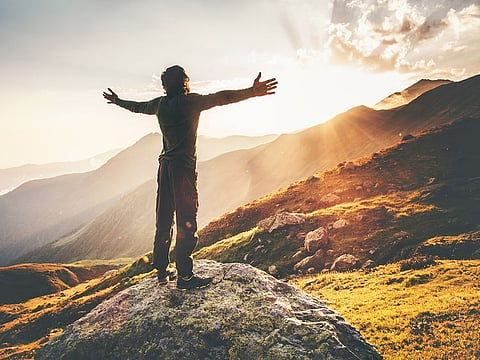Somewhere, beyond the horizon
We are each governed by our sunrises and sunsets

Have you ever stood on a cliff and looked out at sea, along the horizon? It might be to the east where the sun rises each morning, the first rays of dawn piercing the inky and darkest hours of night, a new light, a new day rising with such optimism.
There is a certainty to that that has reassured us all from our most primitive times.
But stand on a cliff and look to the west, where the sun slowly sinks each evening, its slow and gradual slip into the waves slowly bringing the shadows of night once more.
I can stand on cliffs for hours at a time, blown by the wind, rain or mist buffeting my frame as I gaze out beyond the horizon, watching the sun decline and fall from the imperial majesty of the day, looking for the first star that might piece the twilight.
Make a wish on the first star, they say, and you will have good fortune. The greatest fortune is witnessing every passing day, every sunrise, every sunset.
Also Read: The harsh reality of life on the farm
Also Read: Lighting a fire under my indifference
Also Read: Selfies and self-reflection at the Alhambra
From such cliffs generations of men wondered what lay beyond the horizon. They ventured out where there was nothing but horizon surrounding them, and still wanted to venture further.
There are places up and down the western coasts of Europe that marked our belief that this is where the world ended.
Finisterre, Finestra, Land’s End. A place where the boundaries of our civilisations were marked by the great water that lay beyond. And yet there is always an innate quest in each of us to know what is next. We may not stand on cliffs and gaze out over the briny waves that wash ashore, but we seek to sail beyond, to venture and wonder what is there where we cannot see.
I am a student of history and a lover of life. I am an explorer of the unknown, wanting to know what is beyond where I cannot see.
Such is our nature
From the time that our earliest ancestors could stand, pick up a stone and wonder what would happen if we used it to throw, a spear to throw, to wonder further and forage for food, we have always questioned. Such is our nature.
I was thinking the other day about the nature of time itself. Who was is that observed that the moon came in cycles and set the patterns over the seasons. Who was it that noticed that the sun rises and sets and there are subtle changes in where that happens. And who was it that figured out the rising of the sun were highest on the same days — but were not in synch with those patterns of the moon.
And having observed and figured out such things, how would you convince others to build monuments such as Stonehenge or others, independently, around the Earth, to mark such things.
There is a wisdom there that fascinates me. There was enough understanding to calculate time and space and the cycle of the seasons and life itself, yet we did not know at the time what lay beyond in the seas beyond the horizon.
How wonderful were we to look at the stars each night and see that there were patterns that occurred, and they we could use those to mark time itself. And where we were. Where we might go. What might lie beyond.
Now we know what lies beyond those horizons, we can gaze down and see our world, its fullness and wholeness, its beauty and fragility. We know too what lies beyond in the stars and galaxies, the gases and vastness of our universe. Yet for all of our wisdom we are, each and every one of us, governed by our limited sunsets and sunrises.








